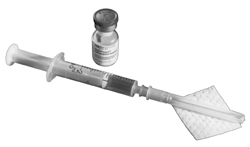|
|
 Previous Chapter Previous Chapter  Previous Page Next Page Previous Page Next Page  Next Chapter Next Chapter 
CHAPTER 4
Progestin-Only Injectables
| Key Points for Providers and Clients |
- Bleeding changes are common but not harmful. Typically, irregular bleeding for the first several months and then no monthly bleeding.
- Return for injections regularly. Coming back every 3 months (13 weeks) for DMPA or every 2 months for NET-EN is important for greatest effectiveness.
- Injection can be as much as 4 weeks late for DMPA or 2 weeks late for NET-EN. Client should come back even if later.
- Gradual weight gain is common.
- Return of fertility is often delayed. It takes several months longer on average to become pregnant after stopping progestin-only injectables than after other methods.
|
| |
What Are Progestin-Only Injectables?
- The injectable contraceptives depot medroxyprogesterone acetate (DMPA) and norethisterone enanthate (NET-EN) each contain a progestin like the natural hormone progesterone in a woman's body. (In contrast, monthly injectables contain both estrogen and progestin. See Monthly Injectables.)
- Do not contain estrogen, and so can be used throughout breastfeeding and by women who cannot use methods with estrogen.
- DMPA, the most widely used progestin-only injectable, is also known as "the shot," "the jab," the injection, Depo, Depo-Provera, Megestron, and Petogen.
- NET-EN is also known as norethindrone enanthate, Noristerat, and Syngestal. (See Comparing Injectables, for differences between DMPA and NET-EN.)

- Given by injection into the muscle (intramuscular injection). The hormone is then released slowly into the bloodstream. A different formulation of DMPA can be injected just under the skin (subcutaneous injection). See New Formulation of DMPA.
- Work primarily by preventing the release of eggs from the ovaries (ovulation).
 Previous Chapter Previous Chapter  Previous Page Next Page Previous Page Next Page  Next Chapter Next Chapter 
|